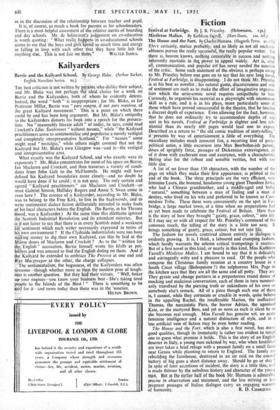EiWY certainly, malice probably, and as likely as not all
unclurit- ableness pursue the really successful, the really popular writer. Yet
there is, heaven knows, nothing censurable in success and nothing inherently inartistic in the, power to appeal widely. Art is, after all, communication, and popular art' has never needed the sanction of the critic. Some such statement of the obvious is perhaps owing
to Mr. Priestley before one goes on to say that his new long novel, Festival at Farbridge, is disappointing. I do not think Mr. Priestley is at his best as novelist ; his natural gusto,.discursiveness and vein of sentiment are such as to make the effort of imaginative Organisa- tion which the serio-comic novel requires antipathetic to him.' Curiously, he organises his material as a playwright with uncommon • skill as a rule, and it is in his plays, more particularly some a those which have proved unsuccessful in the theatre, that he touches a.discreet depth of experience. Even allowing for the fact, however,' that he does not ordinarily try to accommodate depths of any sort in his novels, Festival at Farbridge is slighter and less sub- stintial than its nearly 600 pages would lead one to expect. Described as a return to "the old comic tradition of story-telling," ' it • presents by way of entertainment a little of everything. The miscellany includes much innocent fun, a recurring hint of party-. political satire, a little excursion into ,Max Beerbohm-ish parody, chises of sprightly farce, passages of Dickensian extravagance, all of it done with exuberant ease and assurance, with a characteristic *ling also for the robust and sensible verities, but with too little else.
.A list of no fewer than 130 characters, with the number of the• page on which they make their first appearance, is printed at the'
end of the book. The three principals are the very efficient, very feminine Laura, the bronzed, handsome young giant Theodore Jenks, who had a Chinese grandmother, and a middle-aged and bulky "natural," something between a man of 'feeling and a' Man of destiny, who lived on his wits and preferred to be known as Corn.
modore Tribe. These three were conveniently on the spot in Far- bridge, a large market town, at a time when no preparations had as yet been made to celebrate the Festival of Britain. Here then is the story of how they brought "gaiety, grace, colour," into life. If. I may say so with all respect for Mr. Priestley's command of the common touch, the telling of the story is a little too easy. It brings something of gaiety, grace, colour, but not into life, The fashion for novels contrived almost entirely in dialogue is evidently growing. It is, I think, a laboured and cramping fashion, which hardly warrants the solemn critical trumpetings it receives. But of a first novel in this kind, or nearly in this kind, Miss Kathleen Farrell's Mistletoe Malice, I am bound to say that it is delicately and astringently witty and a pleasure to read. Of the people who compose the Christmas family reunion at a country house in a South Coast village (Bishopstone ?) the sulphurous Mrs. Page in the kitchen says that they are all the same and all potty. They arc. They gyrate and change partners in a preposterous round dance of mocking and malicious conversation, each of them in turn moment- arily transfixed by the piercing truth or unkindness of his own or somebody else's remark. All of a piece though each one of them is, I cannot, while they coruscate or crackle in words, quite believe in the appalling Rachel, the insufferable Marion, the ineffectual
Thomas, the narcissistic Piers, the horror Adrian, the agonised Kate, or the martyred Bess, and yet so soon as each is silent he or she becomes real enough. Miss Farrell has genuine wit, an acute feminine intelligence and a natural distinction of style, and in 3 less artificial vein of fiction may be even better reading.
The House and the Fort, which is also a first novel, has many good qualities, though 'its immaturity is rather too evident to tempt
one to guess what promise it holds. This is the story of an English deserter in Italy, a young man sickened by war, who when hostilities are over takes a brief refuge with a peasant family on a small farm
near Genoa while planning .to return to England. The family are
rebuilding the farmhouse, destroyed in an air raid, on the coastal battery of big guns a short distance away. Should he go or stay? In spite of later accretions of incident, the story is a little thin, and is made thinner by the nebulous history and character of the young man. But in the earlier half of the book Mr. Humana is admirably precise in observation and statement, and the less striving or less pregnant passages of Italian dialogue carry an engaging warmth


































 Previous page
Previous page